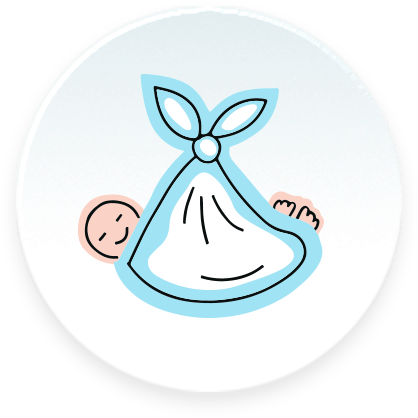The main participant is the baby
Pregnant women (or the baby’s father or older sibling) with type 1 diabetes were approached to participate.
This is the only study in the world to follow babies from the pregnancy. Some babies were enrolled up to six months postnatally.
participants
Target
Current
Participants
Pregnant women, the baby’s father or older sibling, with type 1 diabetes were eligible to participate in the ENDIA Study. Babies up to six months of age who had a parent or sibling with type 1 diabetes were also eligible.

Pregnant women with type 1 diabetes

Men with type 1 diabetes whose partner was pregnant

Children with type 1 diabetes whose mum was pregnant

Babies up to 6 months of age whose parent or sibling have type 1 diabetes
What Does Participation in ENDIA Involve?
Watch this video made by ENDIA’s Lead Investigator, Professor Jennifer Couper, and some of our participants as they tell you more about the ENDIA Study. ENDIA staff follow-up participating babies at regular intervals throughout their development to examine all sorts of factors which might protect or trigger type 1 diabetes, e.g. foods, fluids, viruses, bacteria, inflammation, genes, body composition, etc.
How often are study visits?
Depending on when and where families entered the ENDIA Study, there will ideally be three study visits during pregnancy, two quick visits after the birth, then 3-monthly visits until the child turns 2; that’s 4 visits per year. Once the child is aged 2, visits will only be every 6 months; twice a year.  For those families who don’t live near an ENDIA hub, they are participating in the Regional Participation Program; follow-up is less frequent and conducted from home.
For those families who don’t live near an ENDIA hub, they are participating in the Regional Participation Program; follow-up is less frequent and conducted from home.
Regional Participation Program
The Regional Program was introduced to give people living in more rural and remote areas the opportunity to contribute to this important research from the comfort of their own home.
The ENDIA Study
The ENDIA team will be investigating a number of environmental factors that we believe may contribute to the development of islet autoimmunity and type 1 diabetes in children.
Frequently Asked Questions
- pregnant women with type 1 diabetes
- men with type 1 diabetes whose partner is pregnant
- children with type 1 diabetes whose mother is pregnant
- babies aged 6 months or less whose mother, father, brother or sister is living with type 1 diabetes.
- $20 Coles/Myer vouchers for every clinic visit attended.
- parking vouchers or free parking for clinic visits (where possible).
- home visits for families having trouble attending our hospital or health care clinics.
- the option of entering our Regional Participation Program to continue involvement from home if ENDIA clinics are too far away.
- results of tests such as your child's height and weight, vitamin D, coeliac and antibody status.
Damien McLeod on Being a Father of a Child with Type 1 Diabetes
ENDIA Dad, Damien McLeod, writes about being a father of a child living with type 1 diabetes.
Heidi, Jo and Imogen
Heidi was diagnosed with type 1 diabetes when she was 9 years old. She is now 36 years old, so that’s 25 years of living with type 1. But rather than dwell on this, Heidi works as a social worker with the same dedicated treating team that cared for her as a child. So Heidi lives and works with diabetes 24/7 and loves her job.
The Parker Family
Evan Parker is one of many members of his extended family that live with type 1 diabetes. He’s had type 1 diabetes for 30 years. His wife Andrea, and two sons, have been participating in the ENDIA Study from Adelaide since before both boys were born. The eldest, Alexander, is over 4 years old now!
Cadence
Cadence was diagnosed with type 1 diabetes when she was 18 years old; over 17 years ago. She came across the ENDIA Study in her role as a Senior Research Grants Officer at the University of Adelaide. Cadence was determined to continue contributing to research throughout her pregnancy and her child’s early life. Her eldest son, Edwin, has been involved in the study for five years now!
Introducing ENDIAN 1400!
Introducing our 1400th participant in the making! This little bubba-to-be also has a big brother, Luke, enrolled in ENDIA because their mum, Nadia, lives with type 1 diabetes. We were very lucky to catch up with Nadia recently to find out more about her experiences with type 1 diabetes and participation in the ENDIA Study.
Zooming with the Papettas Family about ENDIA & CGM
Today we were delighted to zoom with Andrew, Emily and Adam Papettas. The Papettas Family have recently completed participation in our new CGM Study. Adam wore a CGM for a period of two weeks to help us monitor his blood sugar levels over this time, as well as other children participating in ENDIA.
Mortensen Family: It's about more than type 1 diabetes
The ENDIA Team recently received a message from ENDIA mum, Cynthia. She has twin girls in the study, Alice and Mia. Cynthia wanted to thank ENDIA for the early detection of Alice’s coeliac disease well before she got sick. Given she is a mother of four young children, we were extremely lucky to find Cynthia available for a chat during a “quiet moment” to discuss her experiences with autoimmunity and participation in type 1 diabetes research with all of her children. “ENDIA is the best decision we’ve ever made for our kids.” Read more here…
Zoe Phillips
My life with type one diabetes has definitely been a rollercoaster with no two days the same. I have always been super sensitive to changes in insulin. According to my endo, I was on baby doses until I got my first insulin pump; the pot of gold at the end of a rainbow for my control. Granted, I do still have days where unideal things happen, but the most important thing to remember is that we are all human, not textbooks. Which is why I have always tried to live by the mantra that although I have diabetes, it does not have me; meaning that I will never let it stop me from living life to the fullest or achieving the goals and dreams that I want, including becoming a mum.
Meet the Willoughby Family
Adam and Bec Willoughby live in Adelaide, SA. They have four gorgeous children: eldest son, Charlie, their twin boys, Hugo and Jack, and 12 month old baby girl, and ENDIA participant, Poppy. Charlie was diagnosed with type 1 diabetes aged 3 and a half years. Bec recently wrote a piece for Mamamia about Charlie’s diagnosis and their involvement in the ENDIA Study. We’re sharing excerpts of Bec’s story here…
The Viskovitch Family
Meg Viskovitch recently shared with us why she and Greg said yes to ENDIA and what their experiences have been during their years of involvement in the study.
Stanton Family
Emily, Scott and Jemima Clarke are taking part in the ENDIA study from Perth, WA. Emily has had type 1 diabetes for 22 years.


